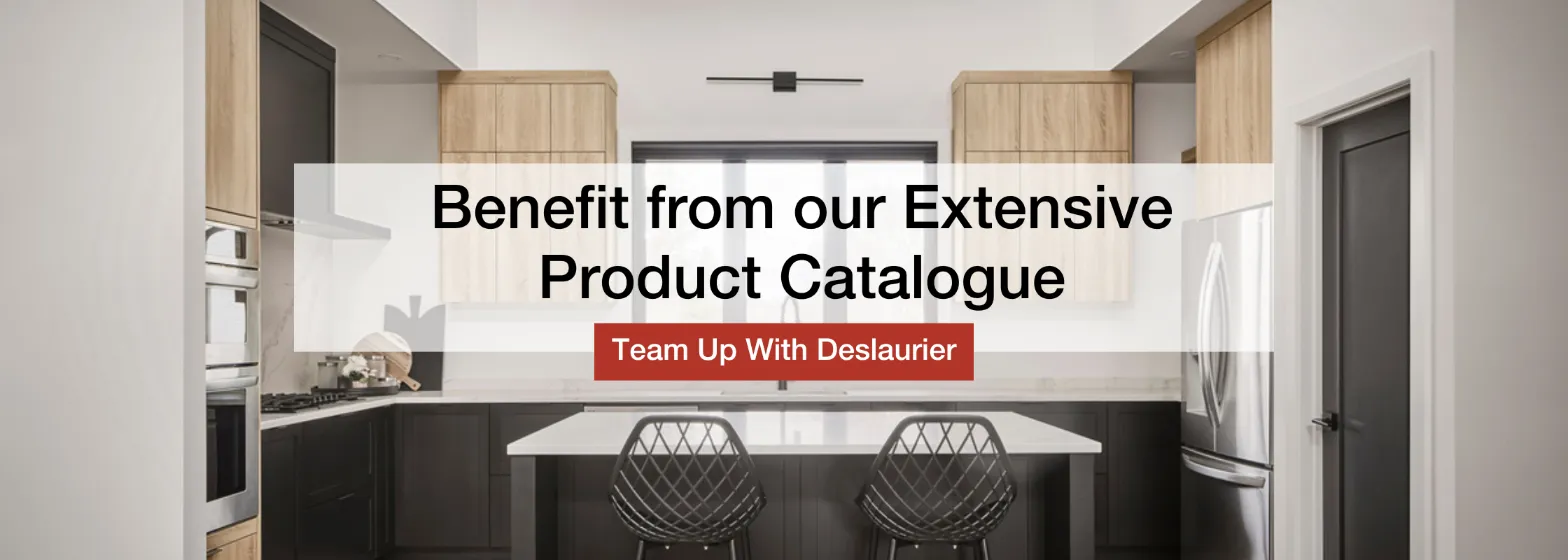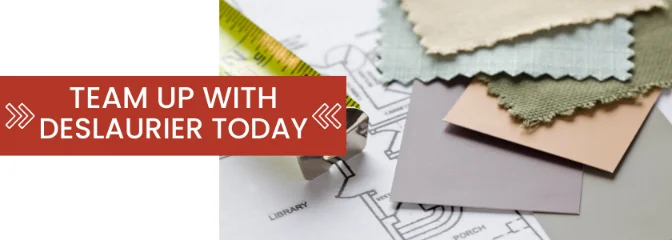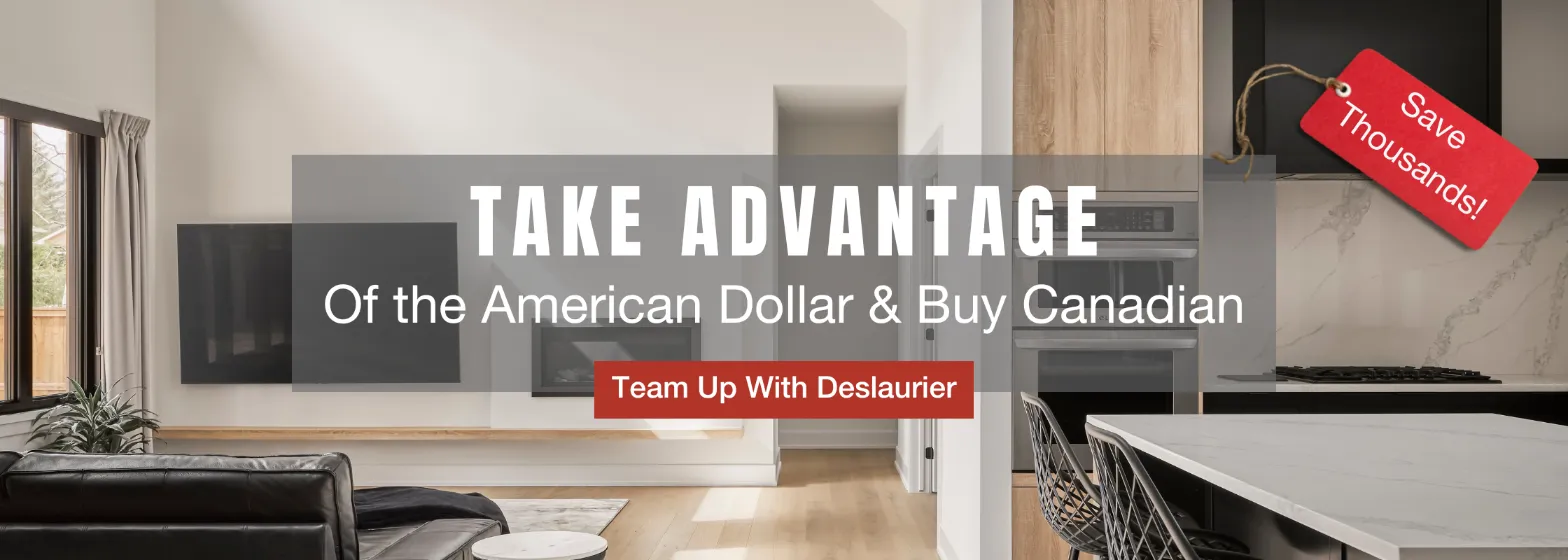18/05/2022 • Blog, Product Reviews, Design Tips
Environmentally Friendly Kitchen Materials
Estimated Read Time: 8 Minutes
With the increased implementation of renewable energy, electric vehicles, or recycled materials, the transition to more environmentally friendly practices is happening all around us. The housing industry is no different. Most notably, the solar panel roofing boom of previous decades.
But what about inside of the house?
These days, there are plenty of eco-friendly building materials that can be popularly utilized in your kitchen design. In fact, your current kitchen might have some materials that you didn’t realize were environmentally friendly!
At Deslaurier, we’re experts in all things custom cabinetry. During our design process, our clients often ask us about environmentally friendly materials that they can incorporate within their kitchen.
With that, we’ll detail a number of different eco-friendly materials you can implement in your kitchen, from your flooring to your countertop.
Let’s get started!
|
Table of Contents |
|
What Makes a Material Environmentally Friendly? Environmentally Friendly Cabinet Materials Environmentally Friendly Flooring |
What Makes a Material Environmentally Friendly?
You’re more than likely aware of terms such as “environmentally friendly,” “eco-friendly,” or “green.” With so many global industries like the energy and automotive fields transitioning to environmentally friendly practices, the concept has become part of our daily vernacular.
While these terms are all virtually interchangeable, what do they actually mean when it comes to materials you can use in your home?
Eco-friendly simply constitutes that something is not harmful to the environment. Products that are eco-friendly prevent contributing to the earth’s land, air, and water pollution. They may also help to conserve resources such as water and energy themselves or through their fabrication process.
Further, these products can reduce VOCs (Volatile Organic Compounds) and HAPs (Hazardous Air Pollutants).
Practices and methods to extract these materials can also be environmentally friendly, like responsible sourcing, manufacturing, and transportation.
Finally, these materials themselves can be highly sustainable. Whether they’re made from recycled materials or easily replenishable like bamboo (more on that below).
Eco-Friendly Cabinet Materials
When it comes to kitchen cabinets, there are a number of ways to utilize eco-friendly materials and practices.
For instance, popular natural wood cabinet options like walnut and maple can be created using sustainable sourcing and manufacturing practices. While the sourcing and transportation of these products might be responsible, they are still not entirely eco-friendly.
Instead, we’ll focus our attention on cabinet materials that are made from recycled materials like MDF, or a highly sustainable and easily replenishable product like Bamboo. We’ll also touch on environmentally friendly materials for cabinet box construction.
MDF Cabinets
Medium density fiberboard (MDF) is a material manufactured by breaking down softwood and hardwood residuals into wood fibres. These wood fibres are compacted with wax and resin, formed into panels, and applied with high pressure and temperatures in order to create a durable, condensed board.
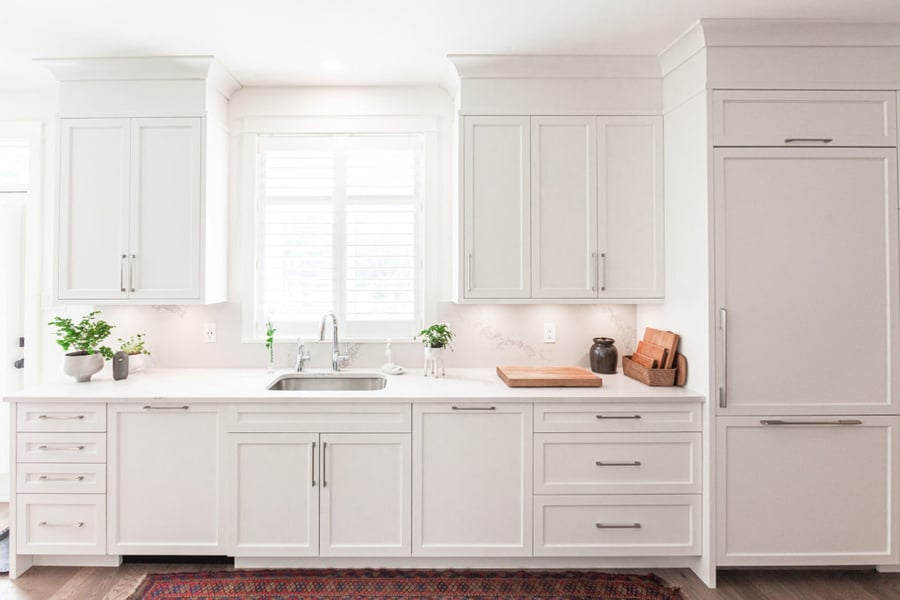
MDF is considered a “green” and sustainable material thanks to its creation out of recycled wood products. The wood fibres, wood shavings, and other wood residuals that would typically be discarded are instead utilized as the primary foundation of MDF.
MDF can be used to produce high-quality kitchen cabinets and the material lends itself as an exceptional surface for a painted finish.
Bamboo Cabinets
Bamboo is a material you’ll see again in this article, and it’s no surprise why: Bamboo is a fantastic building material that is also environmentally friendly!
For starters, bamboo is actually a type of grass, not a wood species! Don’t let that designation fool you, as bamboo’s strength and durability surpass some of the hardest woods available like maple and oak.
Since bamboo is a grass, it naturally replenishes much faster than regular wood species. Although it still has to be harvested, which requires energy, some species of bamboo can grow as much as 30 inches in a single day!
Having said that, there is no strength grading system for bamboo, which makes it very important that you do your research and properly vet your manufacturer or supplier.
NuGreen Particleboard Cabinet Box
Often made from plywood or particleboard, cabinet box construction itself is also a great place to implement alternative, environmentally friendly materials.
A cabinet box material we use at Deslaurier is NuGreen particleboard. The product is certified by the FSC (Forest Stewardship Council) as well as the ECC (Eco-Certified Composite).
Not only do NuGreen cabinet boxes not contain any added formaldehyde, but they are also constructed using 100% pre-consumer recycled or recovered wood fibres, which saves trees and avoids landfills.
Eco-Friendly Cabinet Finishes: Water-Based Paints and Stains
When it comes to cabinet finishes, water-based paints and stains are a much better choice than oil or solvent-based products.
Water-based finishes are very low in VOCs and HAPs, which eliminates the presence of formaldehyde and toxic off-gassing in your homes. The best part is that the colour and appearance of these finishes are just as beautiful and uniform as oil and solvent products!
At Deslaurier Custom Cabinets, we only use water-based paints and stains for our cabinets. We ensure our water-based finishing systems are environmentally friendly for both our customers and our employees!
Like the sound of Deslaurier water-based painted cabinets in your dream kitchen? Kickstart your kitchen design process by booking a free consultation with a Deslaurier expert today!
Environmentally Friendly Flooring
Cork Flooring
A well-respected "green" and natural material, cork stands alone in the category for eco-friendly design.
Cork flooring is made from harvested bark—the cork trees stay intact from start to finish and the bark replenishes itself—meaning the environmental impact is minimal! The cork is then ground up and compacted into thin sheets that are naturally hypoallergenic and antimicrobial.
Cork flooring is a premier choice for the eco-conscious customer. Beyond the fact that it’s a renewable resource, cork has a green impact on the home by working as a natural insulator.
Cork simultaneously keeps kitchen floors warm and uniquely stylish!
As an added bonus, cork boasts a soft, spongy surface that offers support for your feet, legs, and back; making it one of the most comfortable flooring options for any room in the house.
Bamboo Flooring
A prized exotic wood, as mentioned with regard to cabinets above, bamboo of the most eco-friendly building materials available today.
Along with its recognized strength, bamboo flooring is also naturally resistant to water and mildew. Making it an ideal material to implement in the kitchen, where spills and splashes are prone to happen.
Aside from that, many of the same qualities that make bamboo such an eco-friendly cabinet material also apply to flooring. Bamboo grass is highly sustainable, replenishes quickly, and makes for an exceptionally strong and durable building material.
Environmentally Friendly Countertops
When it comes to “green” products, countertops might have the most plentiful selection of any kitchen feature.
There are a wide variety of options including PaperStone (made from recycled paper) or IceStone (made from recycled glass and concrete). While these choices are fantastic eco-friendly solutions for beautiful kitchen countertops, they are also harder to source as a consumer.
For this, we’ll focus on more popular environmentally-friendly countertop options like Dekton, Cambria quartz, and butcher-block surfaces.
Dekton Countertops
Dekton countertops were created by Consentino, a Spanish company that also manufactures surfaces like Silestone quartz countertops. In fact, Dekton was created to improve the performance of quartz countertops!
Dekton is a blend of raw materials used to produce porcelain, glass, and quartz work surfaces. It utilizes a process referred to as “Sinterized Particle Technology,” which accelerates the metamorphic changes which occur to natural stone.
Essentially, instead of spending thousands of years under high pressure and high temperatures like natural stone, this high-tech method creates a synthetic replica using raw materials that can be used to create incredible countertops.
Dekton products are carbon-neutral, and the company was awarded the Environmental Product Declaration (EDP) certificate. Consentino also manufactures an “eco” line of popular countertops like quartz that utilize 75% recycled content!
Cambria Quartz Countertops
Quartz has become one of the most popular countertop materials in recent decades thanks to its luxurious appearance and low-maintenance qualities. Quartz also happens to be a more eco-friendly countertop selection than natural stone products like granite or marble.
Technically, quartz is an engineered stone countertop, meaning that while 93% of the surface is pure quartz, the remaining 7% of the stone is manmade.
Essentially, what fabricators do is grind up the quartz mineral and glue it back together with polymers and binders. Quartz has a longer replacement life than natural stone surfaces and can be recycled.
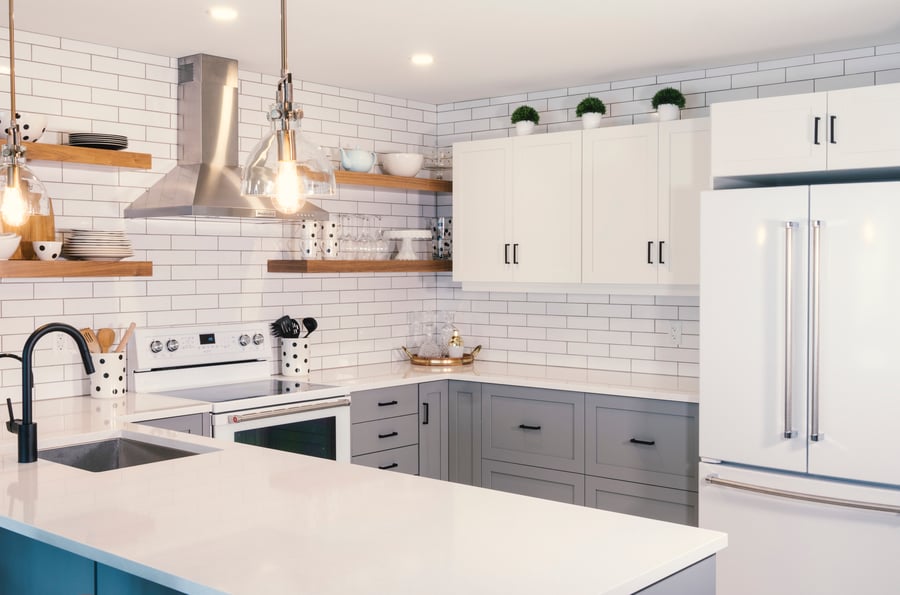
At Deslaurier, we offer some of the finest quartz countertops from manufacturers in North America, including Cambria. Cambria is renowned for their eco-friendly practices. They recycle all metal tooling, as well as 100% of the water used in their polishing process.
Cambria has been certified as low-emitting by GREENGUARD, meaning they don’t emit any harmful substances such as radon or VOCs. Cambria also utilizes more eco-friendly methods than other quartzes by sourcing and manufacturing strictly in North America.
Butcher-Block Countertops
Depending on the manufacturer, butcher-block countertops can be created solely using reclaimed wood and local materials. Avoiding the use of toxic finishing products can also help ensure your butcher-block kitchen countertop is as eco-friendly an option as possible.
Reclaimed wood is processed wood that has been retrieved from its original application and harvested for new uses. Think old barns, decks, factories, and other buildings. It’s a phenomenal way to salvage old lumber and create a new function. In this case: butcher block kitchen countertops
Even more, reclaimed butcher block countertops can produce some of the most remarkable kitchen countertops you’ve ever seen! They allow you to spark your artistic side by selecting unusual wood grain patterns, like end grain, edge grain, or face grain.
Take a look at this butcher block surface from a Detroit-based company that utilizes the beautiful end-grain patterning of salvaged pine from local Detroit homes.
Reclaimed wood butcher blocks are a great way to create a stunning aesthetic statement in your kitchen design while also making a big impact through your environmental choices.
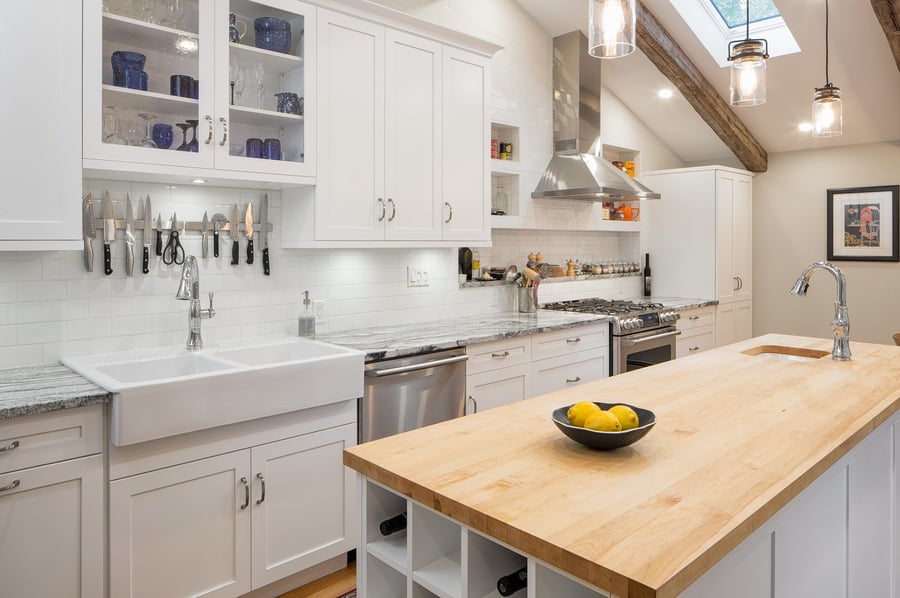
Energy-Efficient Appliances
Lastly, let’s touch on kitchen appliances.
Although not a kitchen material, energy-efficient appliances can have a big impact on the environment by reducing greenhouse emissions, and on your wallet by saving you plenty on your hydro bills.
The design of energy-efficient appliances allows them to utilize the lowest energy when completing their desired tasks. Other appliances utilize renewable energy sources like water and solar power.
The design of these appliances allows them to operate under low energy and temperature settings, allowing them to sustain their operation until they complete their tasks.
From your fridge to your dishwasher, energy-efficient appliances are more available than ever before.
Design with Deslaurier Custom Cabinets
As you can see, there are more ways than ever to incorporate environmentally friendly materials and practices into your kitchen.
At Deslaurier Custom Cabinets, we pride ourselves on our eco-friendly, sustainable manufacturing practices.
In doing so, many of the environmentally-conscious materials listed above are often implemented in our kitchen designs; such as our wide variety of water-based paints and stains; MDF cabinet doors & NuGreen cabinet boxes; and cambria quartz countertops.
If you have your eye on custom cabinetry, Deslaurier Custom Cabinets has everything you need. With over 40 years of experience to our name, we provide our clients with a fully customized design process with our talented team of designers.
Book a free consultation with a Deslaurier kitchen expert at our Jupiter, Florida showroom!
Interested in becoming an authorized Deslaurier dealer? Visit our Become a Dealer page to learn more! Live outside the area? Find a Dealer to connect with a Deslaurier dealer near you!
